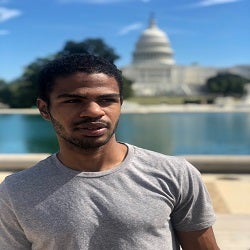
David Tyus was awarded a individual predoctoral NIH Ruth L. Kirschstein National Research Service Award from the National Institute for Allergy and Infectious Diseases in August 2021.
David is a 4th year Neuroscience graduate student from Nashville, TN. He studied Biology with a focus on Neuroscience during his undergraduate studies at Washington University in St. Louis. He started his research journey there, studying potassium-sensitive ion channel mutations in a rare disease called Cantu Syndrome. He also had the opportunity to study the role of complement, a protective multiprotein system circulating in blood, in the brain through support from the BP ENDURE summer program. He joined UVA to learn about the weird intricacies in the relationship between the immune and the nervous system. After completing his research rotations during his first year in the program, he joined Dr. Bill Petri’s lab in 2020. David’s research focuses on Clostridoides difficile infection, a diarrhea-causing, hospital-acquired infection. C. difficile is a difficult clinical issue, as antibiotics increase the risk of a patient becoming re-infected. The Petri Lab has found that particular immune cells and molecules modulate disease severity. The field of neuroimmunology has identified that immune effectors are coordinated by different components of the nervous system in many infectious and inflammatory disease. David’s research has uncovered a role for the sympathetic nervous system (SNS), popularly recognized as the body’s “flight or fight” response, in driving symptoms in C. difficile infection. He is finding that the contributions of the SNS in C. difficile infection might be working in a way that is different in other diseases. His current work is focused on dissecting the mechanism(s) driving his observations. When asked what motivates his scientific pursuits, David noted that the broadest question he has is “how does the environment cause actors in that environment to act differently?”. He came into science wanting to understand why people did the things they did and what goes into making that simple question into a complex one. Today his questions are more granular but carry that same thread. In his current research, he strives to understand how the SNS works in C. difficile and, more broadly, to determine if this mechanism could apply to other diseases. He has a hunch that what we see as black box complexity can be untangled by comparing and contrasting the environment-actor interactions we see under different contexts and conditions. In the future, David would like to continue working at the crossroads of neuroscience and immunology. With that next step in mind, he is looking forward to employing tools of computational biology and data science to answer similar questions at different scales. Ultimately, he hopes that his findings could be applied to understanding what factors make patients vulnerable to disease and what targets make sense in a disease context. Outside the lab, he enjoys running, rock climbing, and singing. He is currently the president of the First Harmonics, an all-graduate student acapella group.
